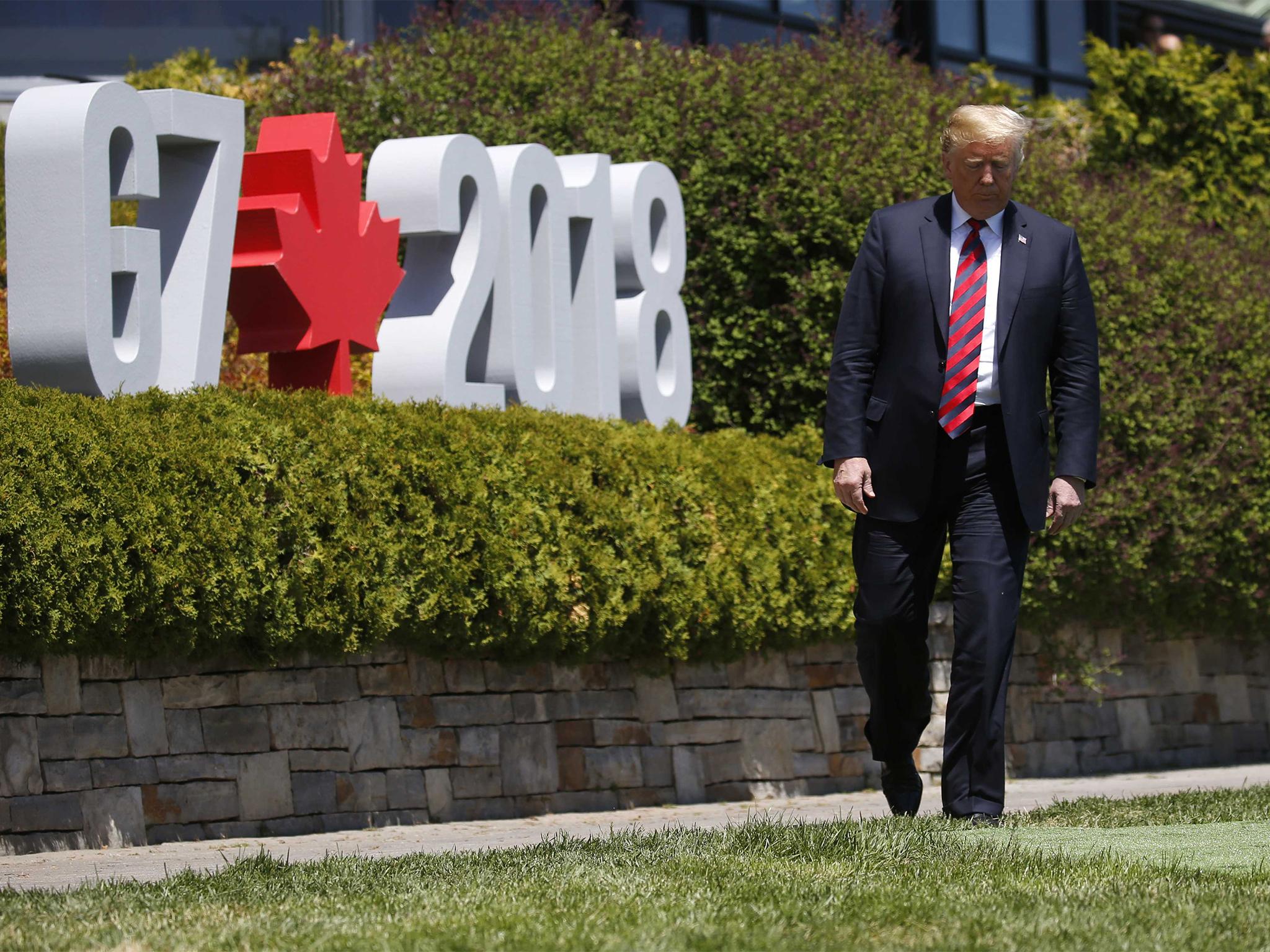There's little reason to be optimistic about the G7 summit
The group’s most influential member has approached the meeting in a combative mood. What message does that send to the rest of the world?

Your support helps us to tell the story
From reproductive rights to climate change to Big Tech, The Independent is on the ground when the story is developing. Whether it's investigating the financials of Elon Musk's pro-Trump PAC or producing our latest documentary, 'The A Word', which shines a light on the American women fighting for reproductive rights, we know how important it is to parse out the facts from the messaging.
At such a critical moment in US history, we need reporters on the ground. Your donation allows us to keep sending journalists to speak to both sides of the story.
The Independent is trusted by Americans across the entire political spectrum. And unlike many other quality news outlets, we choose not to lock Americans out of our reporting and analysis with paywalls. We believe quality journalism should be available to everyone, paid for by those who can afford it.
Your support makes all the difference.There have been times when a G7 summit has felt like a meeting of minds (even if they have also perennially provoked protests by anti-capitalists). In happier times, when Russian involvement made it the G8 and before the world’s wealthiest country was led by a protectionist egomaniac, the exclusive club generated action as well as mutual goodwill.
At this weekend’s gathering in Quebec, the leaders of the world’s leading industrialised nations are arguably at odds as never before. President Vladimir Putin has been excluded since 2014, when Russian forces annexed Crimea, and in the intervening period his relationship with most Western nations has deteriorated considerably. Military activities in eastern Ukraine and the Middle East continue to be indicative of Moscow’s view of itself on the world stage, leaders’ clubs notwithstanding.
Even when it comes to Russia, however, the G7 is hardly united. President Donald Trump has suggested that Mr Putin should be invited back, while Italy’s new prime minister has called for the easing of sanctions. Such views have caused alarm in London, especially, where the fallout from the poisoning of Sergei and Yulia Skripal continues to cast shadows.
Ironically, it seems that Mr Trump will be little more present at the summit than Mr Putin, with question marks hovering over his attendance at all. In the lead-up to the event he has been typically bullish (or bullying) about the trade issues that are top of the G7’s agenda. Taking to Twitter, the US president said he was “looking forward to straightening out unfair trade deals with the G7 countries”, which he accused of imposing “massive tariffs on America”.
Even assuming he does turn up, Mr Trump has already indicated that he regards the summit as a distraction from his upcoming meeting with Kim Jong-un. Indeed, by dismissing the interests of old allies while at the same time pursuing sole charge of peace efforts with North Korea, Mr Trump is seeking to prove that he can be both “America first” and yet not strictly isolationist. His base needs little convincing, but waverers may well be seduced.
Emmanuel Macron’s successful state visit to the US in April left commentators joking about the depth of the French head of state’s bromance with his American counterpart. Even then, however, differences were brewing over the fate of the Iran nuclear deal, and in recent weeks Mr Trump and Mr Macron have appeared to be at daggers drawn.
No mean tweeter himself, Mr Macron noted on social media that “the American president may not mind being isolated, but neither do we mind signing a six-country agreement if need be”. The remaining G6, he went on, “represent values, they represent an economic market which has the weight of history behind it and which is not a true international force”.
The truth is, however, that the G7 can achieve a great deal less when the US is as disengaged as it is under Mr Trump’s administration. What’s more, with the exception perhaps of the meeting’s host, all the G7 leaders have their own problems to deal with.
Theresa May is swamped in a Brexit quagmire (which will make for some tense conversations with Mr Macron, Angela Merkel and Giuseppe Conte); Mr Macron faces violent protests at home against his attempted labour reforms; Ms Merkel’s domestic authority has been vastly diminished by electoral losses and the rise of the far right; Mr Conte may seem confident but is extraordinarily inexperienced; and Japanese prime minister Shinzo Abe is arguably more conflicted than even Ms May in the trade battles being waged by Mr Trump.
All in all, there are few reasons to be positive about the potential outcomes of the gathering, which once had the ability to coalesce the international community around shared policy goals identified by the great powers. This weekend, by contrast, will see more bitter words exchanged around trade and there is no guarantee there will be unity even on the major security questions. As for climate change and gender equality, Mr Trump will already have taken his leave – not that his views on those subjects would be likely to find favour among the other leaders.
It stands to reason that the G7 should provide a forum for the airing of contrary views.
But if its most influential member approaches its meetings in the combative mood that is Mr Trump’s default, what message does that send to the rest of the world?
Join our commenting forum
Join thought-provoking conversations, follow other Independent readers and see their replies
Comments